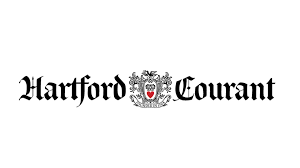
From The Hartford Courant:
Hartford, Bridgeport, Stamford, Norwalk to require masks in restaurants and businesses amid COVID-19 spike.
Hartford, Bridgeport, Stamford and Norwalk will join New Haven in requiring masks in restaurants and businesses amid a spike in COVID-19 cases, the cities announced on Tuesday.
“Masks are a slight inconvenience, but we know that they help to slow the spread,” City of Hartford Mayor Luke Bronin said at a press conference. “The delta variant is out in our community, it is highly transmissible, and it is affecting younger people as well. So we are particularly conscious at this moment when we are just a few weeks away from the start of school that our No. 1 priority is to slow the spread of this variant.”
Bronin said his decision to mandate masks was informed by Hartford’s steadily rising rate of new COVID-19 cases.
“The time to take action to slow the spread is before it becomes obvious that action is unavoidable,” he said. “You’ve got to take action before it’s too late, not after it’s too late.”
Hartford has recorded one of Connecticut’s highest rates of new COVID-19 cases in recent weeks while continuing to have one of the lowest rates of vaccination in the state. Stamford and Norwalk, which have higher rates of vaccination than most Connecticut cities, have seen more modest — but still significant — increases in cases. Bridgeport has recorded a relatively low number of new cases despite a low rate of vaccination.
“We can’t afford to take a step back to closures or capacity mandates, but we can use better judgment and make an easy adjustment to our own behaviors by simply getting vaccinated, and return to putting on a mask,” Bridgeport Mayor Joe Ganim said in a statement. “The masks will help in any situation for those that are vaccinated, not vaccinated, individuals that are vulnerable, and specially to help stop this virus from spreading to a child that is not eligible for the vaccine.”
Hartford and Bridgeport’s new mask rules will take effect Wednesday, while Stamford’s will begin at 8 a.m. Thursday and Norwalk’s will start on Friday. Other mayors, including Shari Cantor of West Hartford, have said they do not plan to implement mask mandates.
Gov. Ned Lamont last week announced he would not impose a statewide mask requirement for all residents but would allow individual towns and cities to require masks in public places if they wished to do so. New Haven became the first town or city in Connecticut to take advantage of the new municipal authority, implementing its mask mandate Monday.
Under current statewide rules, all unvaccinated people in Connecticut are required to wear masks indoors, while vaccinated people must wear them only in high-risk settings such as in health care facilities or on mass transit.
However, both the U.S. Centers for Disease Control and Prevention and the Connecticut Department of Public Health advise residents across the state to wear masks in all indoor public places, regardless of vaccination status, based on the amount of COVID-19 transmission recorded in recent weeks.
Hartford, New Haven and New London counties have recorded enough new COVID-19 cases recently to qualify for the CDC’s definition of “high transmission,” while Connecticut’s other five counties all currently have what the CDC considers “substantial transmission.”
he question of where and whether to require masks has become increasingly contentious as the delta variant has surged in recent weeks. Public health officials have argued for renewed masking to slow the spread of COVID-19, while opponents have decried masks as inconvenient and mandates as unfair.
Some Connecticut businesses have imposed their own masking rules, while others have said they will wait for local guidance. Scott Dolch, executive director of the Connecticut Restaurant Association, said Tuesday he worries mask mandates will discourage people from eating out.
“When you start mandating and restricting, it strikes a little bit of fear where I don’t think there should be with vaccinated folks,” Dolch said. “My biggest concern is how it’s perceived by the public: Is it not safe to go to a restaurant? I don’t believe that’s the case.”
Howard Forman, a Yale professor of public health, said he supports mask mandates in places with high transmission but that officials should also educate residents about when they might be at the most risk. A crowded bar, for example, likely carries much greater likelihood of COVID-19 spread than a large open space.
“In a municipality that has very high transmission, using a mask mandate may be the best approach because you’ve already got such high transmission that people are going to continue to spread, continue to transmit unless you put a heavier hand in place,” Forman said. “But it would be so much better if we could communicate to people about the situations that are putting people at risk.”
